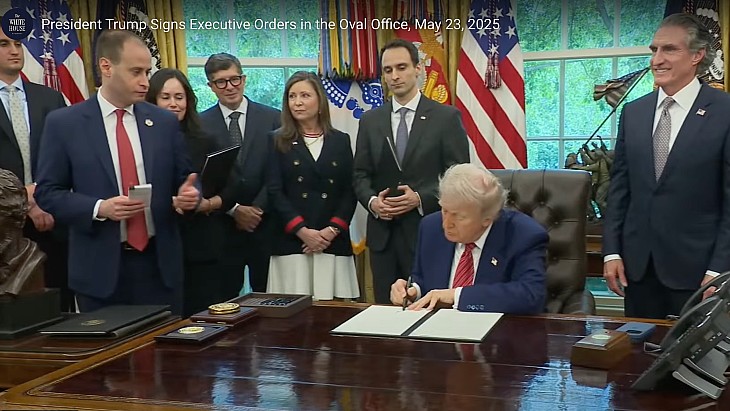UK government gets royal approval for Brexit
Thursday, 16 March 2017
The government announced in January that the UK also intends to leave the European Atomic Energy Community (Euratom) as it exits the EU.
Royal Assent to the bill allows the prime minister to notify Brussels that the UK is leaving the EU. May has said she will trigger the two-year process of exit negotiations by the end of this month, but political commentators say this is unlikely to happen next week to avoid a clash with an informal summit of EU countries. That meeting will mark the 60th anniversary of the Treaties of Rome, which established the European Economic Community, and in turn became the European Union.
John Bercow, the speaker of the House of Commons, told MPs in a live broadcast today: “I have to notify the House, in accordance with the Royal Assent 1967, that her majesty has signified her royal assent to the … European Union (Notification of withdrawal) Act 2017.”
A Downing Street spokesman told the Independent newspaper: "The legislation has been passed unamended, we are pleased that's the case. The legislation has got Royal Assent and we look forward to triggering negotiations by the end of March."
According to the newspaper, the leaders of the remaining 27 EU states had “planned to offer the UK a substantial response” to the Article 50 notification at a European Council summit on 6 April. However, senior figures in Brussels have warned that the timetable will be too tight if May triggers Article 50 in the last week of March, it added.
Because of the timing of Easter and the French presidential elections, the next summit will not take place until the end of May.
The 1957 Euratom Treaty governs the peaceful use of nuclear energy within the EU. The Euratom Community is a separate legal entity from the EU, but it is governed by the bloc's institutions.
Nuclear power plants generate almost 30% of the electricity produced in the EU - from 130 reactor units in operation in 14 EU countries. Each EU country decides alone whether to include nuclear power in its energy mix or not, but Euratom establishes a common market in nuclear goods, services, capital and people within the EU.
The Euratom framework also includes nuclear cooperation agreements with third party countries, including Canada, Japan and the USA. It facilitates UK participation in long-term research and development projects, and it also provides a framework for international nuclear safeguard compliance.
Commenting on the EU Withdrawal Bill and Clause 18 which suggests the UK will no longer be a member of Euratom after the UK leaves the EU, Tom Greatrex, chief executive of the UK’s Nuclear Industry Association, said last month that the UK nuclear industry had made it “crystal clear” to the government that its preferred position is to maintain membership of Euratom. If not, then it is vital, he said, that the government agrees transitional arrangements, to give the UK time to negotiate and complete new agreements with EU member states and third countries including the US, Japan and Canada who have Nuclear Cooperation Agreements within the Euratom framework.
Asked what Brexit will mean for the Office for Nuclear Regulation (ONR), its chief executive Adriènne Kelbie told WNN this week: “Most of our treaties are international and most pre-date Europe, let alone the decision to leave the European Union. We’ll work with government to support whatever is necessary. We regulated before the European Union and we’ll regulate long after it. It will be government that renegotiates agreements, not ONR. We only conduct Generic Design Asessments at the request of government.”
She added: “Leaving Euratom will affect ONR regarding the safeguarding function and again that’s for government to work out what they might want to have as a replacement and they haven’t specified that as yet.”
David Davis, Brexit secretary, told MPs in the Exiting the European Union Committee yesterday that he had briefed the cabinet on the need for contingency planning in case no deal was possible at the end of the two-year Brexit process.
“This is part of an ongoing process that started last year,” Davis said. “And it’s rigorous across every department of state, every single one. It ranges from customs through to agriculture and what we do there, to nuclear safety – every single department of state.”
Queen Elizabeth II has given Royal Assent to the Brexit bill, clearing the way for Prime Minister Theresa May to start talks to leave the European Union.
Queen Elizabeth II has given Royal Assent to the Brexit bill, clearing the way for Prime Minister Theresa May to start talks to leave the European Union. The European Union (Notification of Withdrawal) Bill was passed by members of parliament (MPs) and peers on 13 March and the Queen approved the bill today.The government announced in January that the UK also intends to leave the European Atomic Energy Community (Euratom) as it exits the EU.
Royal Assent to the bill allows the prime minister to notify Brussels that the UK is leaving the EU. May has said she will trigger the two-year process of exit negotiations by the end of this month, but political commentators say this is unlikely to happen next week to avoid a clash with an informal summit of EU countries. That meeting will mark the 60th anniversary of the Treaties of Rome, which established the European Economic Community, and in turn became the European Union.
John Bercow, the speaker of the House of Commons, told MPs in a live broadcast today: “I have to notify the House, in accordance with the Royal Assent 1967, that her majesty has signified her royal assent to the … European Union (Notification of withdrawal) Act 2017.”
A Downing Street spokesman told the Independent newspaper: "The legislation has been passed unamended, we are pleased that's the case. The legislation has got Royal Assent and we look forward to triggering negotiations by the end of March."
According to the newspaper, the leaders of the remaining 27 EU states had “planned to offer the UK a substantial response” to the Article 50 notification at a European Council summit on 6 April. However, senior figures in Brussels have warned that the timetable will be too tight if May triggers Article 50 in the last week of March, it added.
Because of the timing of Easter and the French presidential elections, the next summit will not take place until the end of May.
The 1957 Euratom Treaty governs the peaceful use of nuclear energy within the EU. The Euratom Community is a separate legal entity from the EU, but it is governed by the bloc's institutions.
Nuclear power plants generate almost 30% of the electricity produced in the EU - from 130 reactor units in operation in 14 EU countries. Each EU country decides alone whether to include nuclear power in its energy mix or not, but Euratom establishes a common market in nuclear goods, services, capital and people within the EU.
The Euratom framework also includes nuclear cooperation agreements with third party countries, including Canada, Japan and the USA. It facilitates UK participation in long-term research and development projects, and it also provides a framework for international nuclear safeguard compliance.
Commenting on the EU Withdrawal Bill and Clause 18 which suggests the UK will no longer be a member of Euratom after the UK leaves the EU, Tom Greatrex, chief executive of the UK’s Nuclear Industry Association, said last month that the UK nuclear industry had made it “crystal clear” to the government that its preferred position is to maintain membership of Euratom. If not, then it is vital, he said, that the government agrees transitional arrangements, to give the UK time to negotiate and complete new agreements with EU member states and third countries including the US, Japan and Canada who have Nuclear Cooperation Agreements within the Euratom framework.
Asked what Brexit will mean for the Office for Nuclear Regulation (ONR), its chief executive Adriènne Kelbie told WNN this week: “Most of our treaties are international and most pre-date Europe, let alone the decision to leave the European Union. We’ll work with government to support whatever is necessary. We regulated before the European Union and we’ll regulate long after it. It will be government that renegotiates agreements, not ONR. We only conduct Generic Design Asessments at the request of government.”
She added: “Leaving Euratom will affect ONR regarding the safeguarding function and again that’s for government to work out what they might want to have as a replacement and they haven’t specified that as yet.”
David Davis, Brexit secretary, told MPs in the Exiting the European Union Committee yesterday that he had briefed the cabinet on the need for contingency planning in case no deal was possible at the end of the two-year Brexit process.
“This is part of an ongoing process that started last year,” Davis said. “And it’s rigorous across every department of state, every single one. It ranges from customs through to agriculture and what we do there, to nuclear safety – every single department of state.”
Most Read

International banks express support for nuclear expansion
Monday, 23 September 2024

Trump sets out aim to quadruple US nuclear capacity
Saturday, 24 May 2025

Cabinet moves to reverse Italy's anti-nuclear stance
Monday, 3 March 2025

Sweden budgets for nuclear new build
Wednesday, 11 September 2024
Podcasts & Features
Viewpoint: The vital role of medical isotopes in theranostics
Podcasts & Features Tuesday, 22 July 2025
Viewpoint: Strategic coalitions in nuclear business
Podcasts & Features Tuesday, 8 July 2025






..._58412.jpg)
